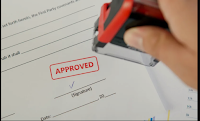ISA 220 QUALITY CONTROL FOR AN AUDIT OF FINANCIAL STATEMENTS
An auditor deals with specific responsibilities regarding quality control procedures for an audit of financial statements. Quality control systems, policies and procedures are established by the audit firm prior to the audit. These policies and procedures are compulsory to abide by all audit engagement teams and engagement quality control reviewer.
Summary of ISA 220 QUALITY CONTROL FOR AN AUDIT OF FINANCIAL STATEMENTS
(Effective for audits of financial
statements for periods beginning on or after December 15, 2009)
Objective
The objective of the auditor is to implement quality control procedures at the engagement level to be sure that:
· The audit complies with professional standards and applicable legal and regulatory requirements; and
· The auditor’s report issued is appropriate in the circumstances.
Requirements
Leadership Responsibilities for
Quality on Audits
The engagement partner shall take
responsibility for the overall quality on each audit engagement to which that
partner is assigned.
Relevant Ethical Requirements
The engagement partner shall form a conclusion on compliance with independence requirements that apply to the audit engagement. In doing so, the engagement partner shall:
1. Obtain relevant information, to identify and evaluate threats to independence.
2. Evaluate information on identified breaches,
3. Evaluate whether the identified threats are at an acceptable level; and
4. Take appropriate action to address the threats that are not at an acceptable level by eliminating the circumstances that create the threats.
Acceptance and Continuance of Client
Relationships and Audit Engagements
The engagement partner shall be
satisfied that appropriate procedures regarding the acceptance and continuance
of client relationships and audit engagements have been followed and conclusions
reached in this regard are appropriate.
Assignment of Engagement Teams
The engagement partner shall be satisfied that the engagement team, and any auditor’s experts who are not part of the engagement team, collectively have the appropriate competence and capabilities.
Engagement Performance
The engagement partner shall take
responsibility for the direction, supervision, performance, reviews, and
consultation of the audit engagement.
Engagement Quality Control Review
For audits of financial statements
of listed entities, and those other audit engagements, if any, for which the
firm has determined that an engagement quality control review is required, the
engagement partner shall:
1. Determine that an engagement quality
control reviewer has been appointed.
2. Discuss significant matters arising during the audit engagement.
3. Not date the auditor’s report until the completion of the engagement quality control review.
Engagement quality control reviewer –a partner, other person in the firm, suitably qualified external person with sufficient and appropriate experience and authority to objectively evaluate the significant judgments the engagement team made and the conclusions it reached in formulating the auditor’s report.
The engagement quality control reviewer shall perform following things:
·
To
discuss of significant matters with the engagement partner.
·
To
review of the financial statements and the proposed auditor’s report.
·
To
review of selected audit documentation relating to the significant judgments
the engagement team made.
·
To
evaluation of the conclusions reached in formulating the auditor’s report and
consideration of whether the proposed auditor’s report is appropriate.
For audits of financial statements of listed entities, the engagement quality control reviewer shall also consider the following:
· The engagement team’s evaluation of the firm’s independence in relation to the audit engagement.
· Whether appropriate consultation has taken place on matters involving differences of opinion and the conclusions arising from those consultations.
Monitoring
The engagement partner shall
consider the results of the firm’s quality control monitoring process fixed in
the latest information circulated by the firm and whether deficiencies detected
may affect the audit engagement.
Documentation
The auditor shall include in the audit documentation:
- Conclusions on compliance with independence requirements that apply to the audit engagement and
- Conclusions reached regarding the acceptance and continuance of client relationships and audit engagements.
- The nature and scope of, and conclusions resulting from, consultations undertaken during the course of the audit engagement.
The engagement quality control reviewer shall document:
- The procedures required by the firm’s policies on engagement quality control review have been performed.
- The engagement quality control review has been completed on or before the date of the auditor’s report.
- The significant judgments the engagement team made and the conclusions it reached were appropriate.




Comments
Post a Comment